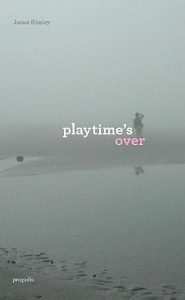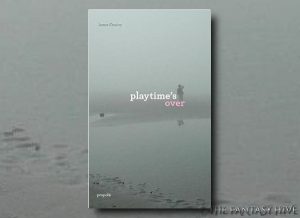PLAYTIME’S OVER by James Kinsley (BOOK REVIEW)
Kinsley’s first novella, Playtime’s Over, was published by Propolis in 2021. His second book, Greyskin is now out from Deixis Press. Greyskin is a fantasy western, a collection of interwoven settlers tales that paint a picture of the colonisation of a newly discovered continent and the fate of the indigenous people who live there, as well as delivering a rich streak of action and adventure.
Kinsley’s Playtime’s Over was written as a response to Kinsley’s own mental health and personal interest in the sector, as well as a love letter to his home city of Norwich. He still currently resides in Norwich, and when he isn’t writing he can be found playing board games or buried in books by his main inspirations, Garrison Keillor, Doug Coupland and Ted Chaing, who are all writers Kinsley holds great admiration for. You can find Kinsley on Instagram @unclekins.
‘Tea. Milk. Sugar. Steam. Warmth.’
Kinsley’s first novella is exorbitantly different to his second publication Greyskin. As I recently reviewed Greyskin, and thoroughly enjoyed it, I decided I wanted to read Playtime’s Over. I was absolutely delighted when Kinsley sent me a copy to read, alongside his recent SciFi From Within, A Darkness (published under the name Ray Adams). I devoured Playtime’s Over in one sitting, and I was NOT disappointed.
 Like Greyskin, Playtime’s Over is littered with confrontations of societal expectations, behaviour, and delicately constructed conversations between characters. Unlike Greyskin, however, Kinsley’s novella looks deep into the mind of an individual in the present day, rather than speculations that lead to cogitation around the problematic past of Empire and colonial discourse. Playtime’s Over considers the interplay of the conscious and the subconscious, the impulses of the Freudian and uncanny Death Drive as well as the chaotic and purposelessness nature of Absurdist human existence. Kinsley does something few else have managed to – he has constructed a grounded and familial absurdist narrative without the surrealist, disorientating, and potentially bizarre attributes one commonly finds stitched in too.
Like Greyskin, Playtime’s Over is littered with confrontations of societal expectations, behaviour, and delicately constructed conversations between characters. Unlike Greyskin, however, Kinsley’s novella looks deep into the mind of an individual in the present day, rather than speculations that lead to cogitation around the problematic past of Empire and colonial discourse. Playtime’s Over considers the interplay of the conscious and the subconscious, the impulses of the Freudian and uncanny Death Drive as well as the chaotic and purposelessness nature of Absurdist human existence. Kinsley does something few else have managed to – he has constructed a grounded and familial absurdist narrative without the surrealist, disorientating, and potentially bizarre attributes one commonly finds stitched in too.
Two men meet. They converse on various topics, times from the past, religious opinions as well as death and suicide. The men seem to be waiting for something to happen, or perhaps for someone to arrive…
Sorry, no. I am not talking about Kinsley’s Playtime’s Over (not yet). Above is the vaguest possible summary of Samuel Beckett’s Waiting for Godot, a notorious absurdist play and possibly the Grandaddy of all Absurdist narratives and theatre christened as ‘Comedy of Menace.’ Waiting for Godot, is, in essence, a play where nothing happens (twice), and the key talking points revolve around this nothingness and fruitless waiting for the infamous and ominous ‘Godot.’ Beckett’s play is a flawless example of The Theatre of the Absurd, a genre that reflects Absurdist theory’s hopelessness and pointlessness through ‘the inevitable devaluation of ideals, purity, and purpose,’ (Martin Esslin). And why is this relevant?
“Irrelevant?”
“Meaningless. Life isn’t inherently fair or inherently unfair. It’s just an absurd question.”
Absurdism, might sound like a cousin of absurd (generally used when something is considered crazy, bizarre, ridiculous) but Absurdism is something entirely other. Albert Camus never intended Absurdism to be seen negatively, Camus simply wanted to highlight the tension between our desire for order, happiness, meaning and the indifferent natural universe’s refusal to provide that. Absurdism is the theory that searching for meaning in an incomprehensible universe, devoid of God or meaning, is entirely futile. Writers like Beckett and Harold Pinter thrived off this theory, addressing it with literal absurdity (bizarre and incomprehensible scenes or plots within their works) with an element of comedy, to highlight the nothingness and existentialism of it all, but also adding humour. These works feel fictional, phantasmagoric and disorientating – very few feel they ‘understand’ these works first time, and even fewer say that they ‘enjoy’ or ‘relate’ to them. These plays disrupt the norm, and many fail to connect with them, even though they are confronting something very real and relatable.
Kinsley’s Playtime’s Over takes it one step further – yes, the interplay of delicate humour, existentialism and pointlessness still lingers, and the ‘waiting’ of course, but even in walking through the protagonists scattering mind as he slowly drowns in the sea (yes, we will get there), there is something hard, and real, and terrifyingly grounded about this absurdist narrative. Kinsley forces the reader to confront the world as it really is, disregarding the need for comical intervals, keeping the narrative intimate, authentic and substantive.
“That’s reality. It is Bleak”
So, let’s try this again.
Two men meet on an empty pier. They converse on various topics, times from the past, religious opinions as well as death and suicide. The men seem to be waiting for something to happen, or perhaps for someone to arrive…
In actuality, Will, has just jumped into the cold North Sea, aiming to end his life. Viktor, who appears to be a concoction of Will’s subconsciousness meets Will on a deserted pier within Will’s mind. As Will slowly drowns in the sea, his subconscious and conscious mind actively engage with each other, battling for a rhyme or reason, scrutinizing ‘why,’ hunting for meaning, even at the end. Together they smoke. They eat chips. They drink tea.
Together, they journey to various areas from Will’s memories, seek comfortable things (like cigarettes and tea), they view art and the most important thing of all, they talk.
“Will took another mouthful of tea and let himself think about the taste as the liquid warmed him mouth, swirled over his tongue and then slid down his throat. He noticed not only the taste, but also the sense of wellbeing that the familiarity brought him.”
Upon opening Playtime’s Over, you are immediately aware of what Will wants to do, and the entire novella is Will, Viktor and the reader trying to seek the escapable and unattainable WHY. The whole narrative is an intricate tapestry of deflection and existentialism, with a disorientating and uncomfortable momentum. Will is drowning. As the reader, you are along for the ride.
As Will has salty water filling his lungs, the reader is drowning in the inevitability of what Kinsley’s novel is forcing you to do. Confront the uneasy and anxiety inducing aspects of reality. Brexit. Religion. ‘What. Are. You?’, Social Media. Racism. Misogyny. Heartbreak. Why? Sexism. Bullying. The social bubble. Equality. Loneliness. The ‘Oh my God are you still here and why are you looking at me like that I just want a F**king Cigarette cigarette.’
Will’s desperate attempt to clutch to the straws of reason, even at the end, provides a necessary distend in the narrative that gives the novella a depth and weight one might not expect from reading the blurb – ‘Together they journey across time and space’ – No! Will and Viktor’s journey goes far deeper than that.
“So your belief was based on an absence of an absence?”
Kinsley’s novella, as expected, held some authorial familiarity with Absurdist works – particularly Harold Pinter’s The Birthday Party, in which there are some echoes of conversational absurdity, As well as Beckett’s Waiting for Godot. Other flickers of familiarity freckled through too. Such as Ali Smith’s Autumn. Smith brings beauty out of the bleak and mundane in her book, and whilst it might appear that ‘not a lot is happening,’ Smith forces readers to consider their perception and acceptance of certain happenstances in the UK – much like Kinsley does.
“This city voted to stay in the EU,” Will said after a while. “An island of Remain adrift on a sea of Leave.”
Whilst this novella is entirely different to his collection (Greyskin), the power and undeniable skill of Kinsley remains. Kinsley is a talented writer who can do more in 95 pages than most can accomplish in 1000. I look forward to reading more.
Playtime’s Over is available now on Bookshop.org

